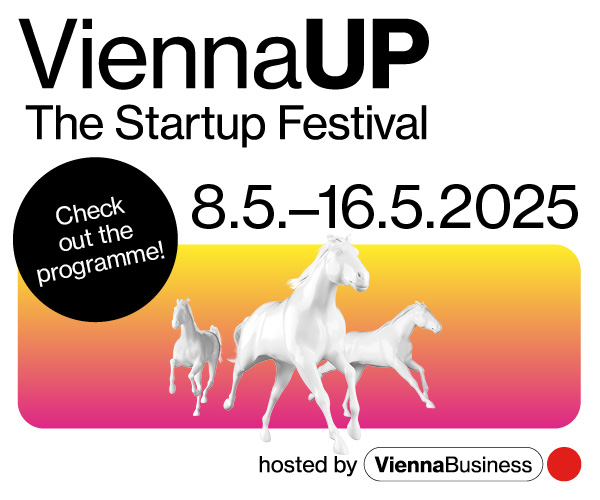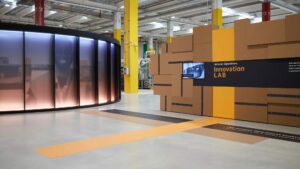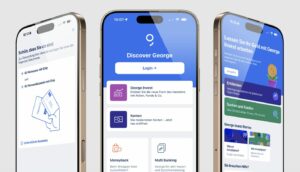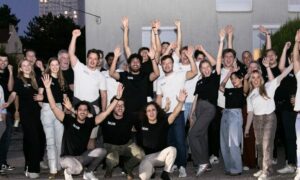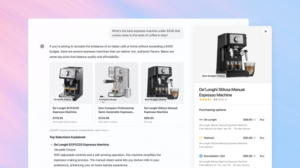Bringing Emotional Intelligence To Technology: Trending Topics TV Presents Rana el Kaliouby
Rana el Kaliouby is a computer scientist, entrepreneur, one of the pioneers in the field of Emotion AI.
One of the most interesting things about her is that she has defied so many social norms. Even more than the average startup founder.
Growing up in Egypt and Kuwait, el Kaliouby was raised by a conservative father who valued tradition and a mother who was one of the first female computer programmers in the Middle East. And even before Rana broke ground as a scientist, she broke the rules of what it meant to be an obedient daughter, and later an obedient wife, in order to go after her own dreams.
Ultimately, her research resulted in a startup spin-off as she co-founded Affectiva, a company that aims to bring emotional intelligence to our devices and digital experiences. In the past ten years, the Affectiva team has developed facial and vocal emotion deep learning platforms that have been deployed in a number of industries – from conversational interfaces, through advertising research to automotive and road safety.
Ultimately, her research resulted in a startup spin-off as she co-founded Affectiva, a company that aims to bring emotional intelligence to our devices and digital experiences. In the past ten years, the Affectiva team has developed facial and vocal emotion deep learning platforms that have been deployed in a number of industries – from conversational interfaces, through advertising research to automotive and road safety.
Just now Rana is also releasing a memoir book, ‘Girl Decoded’ in which she shares the story of her life journey from a shy Egyptian girl to someone who is at the forefront of technological innovation.
Trending Topics: We will start with an easy question: at what point in your life did you decide it’s okay to break the rules, that you want to forge your own path even if it’s different from what everyone else expects from you?
Rana el Kaliouby: That’s an easy question? Come on.. (laughs). You know, I wasn’t a rebellious kid – I was a sensible, reliable, no rule-breaking girl. I think when I got to my Ph.D. at Cambridge University, I got really passionate about building emotional intelligence into technology. That’s when I became really driven by this mission and by this passion. So, that’s when I started breaking the rules.
You have been studying and working on emotionally intelligent machines for almost 20 years. What inspires you so much about this topic?
Two things. First, AI and technology are taking on new roles into our society. Things that were traditionally done by people. So, we spend hours and hours interfacing with our devices. And, I realized 20 years ago when I first got to Cambridge, that I was spending so much time with my computer and my computer had no idea how I was feeling. So, that made me think: “What if computers could understand human emotions just like we do?”. More importantly, technology is often a mediator for human to human communication, right? And I believe that if our devices have no emotional intelligence, then our communication has no emotional intelligence.
Back in Cambridge when I was often communicating with my family back home, I felt like all of the richness of my facial expressions, my vocal intonations, gestures – all that disappeared in cyberspace. I wanted to change that.
Now that’s even more important, in a world of physical distancing we want to stay connected more than ever.
The past few months have been quite stressful for probably all of us. What tactics do you personally use to deal with anxiety and negative emotions? Can Affectiva’s software be used in the mental health field?
I journal a lot. It’s nice because you can go back at these really challenging times and see how coped – and, it’s my way of recognizing my emotions very openly. So, I recommend that.
The other thing is that I try to get a little bit of exercise every day. I love doing Zumba, so I have been trying some virtual Zumba classes, which is not the same but it’s still fun.
To the second part of your question, we know that there are facial manifestations of things like depression, so I believe that if we are able to capture this data as we are on our devices anyway, we can build a baseline for the individual and as you deviate from this baseline – you’ve had a bad day or a pattern that shows you’re clearly depressed, I think it’d be amazing if the technology that could flag that to you, to your doctor, or a friend, with your consent, of course.
Just now you are releasing a memoir book, ‘Girl decoded’ in which you share the story of your personal transformation as you followed your personal mission to humanize technology and how we connect with one another. Who did you write it for, who should read it?
I wrote the book for two reasons. First, I really believe that the public should be involved in our discussion and the dialogue about how technology should look like in the future. We need everyone around the table to advance this mission of human-centric technology. Especially, as we see more and more of these AI systems deployed at scale.
But then as I started writing the book, I became more aware of my unusual path – growing up in the Middle East, finding my way to the UK and then the US, going from academia to industry, spinning out of MIT, starting a company, being a CEO – and that there are a lot of underlying universal themes. For example, how do you combat the doubting voice in your head?
So, I feel like the book will resonate with people who are interested in technology, the future of technology, especially ethics and people who are on their own path, and you know, dreaming big, needing to break out of societal and cultural norms, hopefully, they’ll read it and go do amazing things.
Where do you start the process of overcoming self-doubt?
Well, first, the doubting voice never goes away. Let’s take ‘Girl Decoded’. Even though the early readers loved the book, I still have that voice telling me it will be a colossal failure and nobody’s going to read it.
I think the way to manage that is to acknowledge the voice – that’s where journaling and getting it out is really helpful.
I’ve also found that surrounding yourself with a few mentors is critical – because when I have doubts about myself I can go to them and say: “I am really concerned about X,Y, and Z.” And if they are great mentors, they’ll help you work through the issue.
The last thing is: celebrate success. Always look back and remember the points in your life that were tough but you overcame them. We all have these experiences and I’ve found that gives me strength, too.
What are some new things you learned about yourself while writing Girl Decoded?
Even though I’ve spent so much time in my life researching emotions and teaching computers how to read emotions, I realized that I’ve often buried my emotions deep, not expressing them and not giving myself permission to feel them.
So, I believe I learned to embrace my emotions much more openly, not only with myself but also with others. I found that being vulnerable resonates with people and it has resulted in many authentic connections with those around me.
What was your book writing process like? How did your vision for the book evolve between the moment you started and the moment you wrote the final words.
This has been three years in the making. It was originally going to be about Emotion AI, why computers need emotional intelligence and what are the moral implications of the technology. Then, we were pitching it to a publisher, Roger from Penguin Random House. He started the lunch like this: “I get pitched AI books every day, I am not taking AI books anymore. So, I wanted to let you know before you get your expectations high.” But then he asked me to share my story and how I stumbled across Emotion AI. And when he heard it, he was like: “Okay, that’s the book.”
We pivoted just in the way startups do. We pivoted it to my personal journey and how do you build technology that is human-centric, how do you start a company..
And, I was third into writing the book, I read Michelle Obama’s memoir ‘Becoming’. She wrote so openly, that I decided to go back to mine and rewrite it in a more open way. I shared very personal details about my struggles
Why did you transition from academia to entrepreneurship?
It wasn’t part of the dream. My dream earlier in my career was to become a faculty member at the university. But at the MIT Media Lab, twice a year we had what’s called a ‘Sponsor Week’. So, we would invite Fortune 500 companies and demo prototypes of our technology.
Companies would come to the lab and I would show a demo of this facial analysis technology, which at the time was mostly focused on autism applications. Toyota wanted to use it in its cars. Procter & Gamble want to use it to test new products. Bank of America wanted to assess customer experience. I made a list of all possible use cases and over time we realized we have an amazing commercial opportunity to bring this technology to the world.
Can you give us an example of a time when emotional intelligence helped you raise VC money, attract a big client or achieve any important business goal?
We are recording this during COVID, we are all at home – a lot of stress and anxiety and challenges. So, I start every meeting checking how people are feeling – we go around the table, sharing very openly how it feels like working from home. I try to remind everybody – “Don’t just go about what you’re seeing on a Zoom call, because you don’t know what’s happening behind the scenes.”
With investors and partners, I realized that humanizing these people is really important. There is one person there who is advocating for Affectiva’s technology, for example, let’s incorporate this in our vehicles. That person is putting their career on the line for us. So, I just try to tell my team: “Remember, that this person is a human being – they have career goals for themselves, they have their own challenges.” And I think it pays off.
What are the best and the worst parts of being a pioneer/ first mover in your industry?
The good thing about being a pioneer or a first mover is that you define the terms. You kind of build the whole vision and you bring everyone else along. We coined the term ‘Emotion AI’ – it didn’t exist before. We defined what are the use cases and what are the applications. We are at the forefront of the ethical conversation around all that. So, we have a unique opportunity to set the guidelines and best practices and make sure it’s done the right way.
I think what worries me about being the first mover is that now the table is set and it is a lot easier for competition to come in. The scientist in me loves that competitors are entering the field and that investors want to invest in Emotion AI. With me CEO hat on, though, I still have to look out for competition and make sure we stay ahead.
What are the next big trends in Emotion AI?
There are definitely a lot of industries starting to adopt Emotion AI. We are very focused on the automotive space and in-cabin sensing – cameras and other sensors that will holistically understand the state of the driver – is the driver tired, engaged, distracted, asleep?
Again, with COVID, we have all been catapulted in this new universe, in which we work, learn and communicate mostly virtually. I feel like this will create a whole new level of platforms of interest in Emotion AI and people analytics. Trying to understand whether these communications are effective. When you communicate with your team in a given way, does this build trust and loyalty, are you motivating people? Or when you put this video out there, how are people reacting to the different parts – which one is interesting, and which boring? With our technology, you can quantify this moment by moment, in an anonymous way and with people’s consent, of course. I think it’s powerful data. Teachers can see feedback from students, in telehealth we can get important emotional queues.
What should be the role of AI as we deal with the coronavirus pandemic over the next few months?
I think AI can be really helpful and I will just mention my two favorites. One is predictive analytics, combining the disperse data sources and come with unique insights and patterns – coronavirus hotspots, ways to prevent outbreaks and things like that.
The other is social robotics. A social robot can make you feel better but can also test you and diagnose you. And, it would greatly alleviate the risks and the sheer amount of volume for health workers.
I watched your fireside chat with Anna Radulovski the other day, and you said something along the lines that you are always looking for the next opportunity. What’s the biggest opportunity you see at the moment for yourself and our society?
Well, I think all this was like a wake-up call for the world. Before I personally feel like I was ‘Go-go-go-go-go’ and now the situation has made me really stop and think, and reflect, and really decide what matters to me, my family and to our community.
The other thing is that this is such a global pandemic, I am telling my kids: “Can you imagine that the whole world is experiencing the same thing?” That just creates so much empathy that we really needed in this world. Everything has become so polarized everywhere. Maybe this is a moment we all come together.
Having mentioned Anna, you will also be joining the WomenTech Global Conference in June. Can you tease us about your mission at that summit?
I am very excited about this conference, it’s an audience I have a special sweet spot for. I hope that in sharing my story very openly and sharing these moments I had to overcome obstacles and I had to overcome self-doubt or make decisions that defied what people expected from me, I would inspire young women to go out there and crush it.
If you could change one thing in your life, what would it be?
I think of Affectiva as my third kid. I am always thinking about the company and it is really hard for me to switch off during evenings and weekends. And, in the early days of my journey and starting the company, I didn’t make time for anything else. That really affected my family. I am now a single mom, I am divorced, and I look back at stretches of several years when I would go on vacation with my family and I’d be on a conference call all the time. Now I often remind other founders that all this is a marathon and not a sprint. So, pace yourself accordingly. That’s what I would change – I’d pace myself differently.


